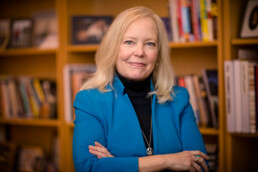Pauline Dakin is the bestselling author of Run, Hide, Repeat: A Memoir of a Fugitive Childhood which won the prestigious 2018 Edna Staebler Prize for Creative Non-fiction. It was also named one of the best 100 books of 2017 by The Globe and Mail.
Run, Hide, Repeat is also the subject of a five-part podcast series of the same name with CBC Podcasts. Amazon called it one of the best podcasts of the year.
In addition, the memoir is the subject of an upcoming feature documentary and is being adapted as a feature film.
Pauline is a professor of journalism at the University of King’s College, where she specializes in teaching audio and podcasting. She is a fellow of the MIT/Knight Science Journalism program (Cambridge, Mass.) on Medical Evidence.
She’s an award-winning journalist who was for many years a trusted voice on health and medical issues as a reporter for CBC National News. She was also the long-time host of the CBC regional documentary program Atlantic Voice.
Pauline’s reporting and documentary work have been recognized with many regional and national awards.
She lives in Halifax with her husband and their two dogs.
Speaking Topics:
Resilience and Overcoming Hardship (Mental Health)
Resilience, or the ability to cope with and recover from difficulties, is one of the fastest-growing and evolving areas of psychological research. Pauline Dakin shares the story of her chaotic childhood as a lens through which to examine the factors that confer resilience, and approaches that can help people develop it in their own lives. Pauline was told her family was on the run from the Mob, necessitating secret moves without goodbyes to family and friends. The truth was even more bizarre, launching a years-long quest for answers and acceptance.
Delusional Disorder: The Worst Mental Illness You Never Heard Of (Mental Health)
After Pauline published her memoir Run, Hide, Repeat, detailing the exquisitely complex and nuanced delusions that hijacked her family’s lives, she heard from people around the world who’d had similar, if less dramatic experiences. They were relieved to have a possible explanation. Delusional disorder is under-recognized and under-studied, and can be present in people who are high-functioning and appear normal. Because it’s hard to spot, it can pose particular risks to families caught up in the dysfunction. Delusional disorder has been suggested as a diagnosis for cult leader Jim Jones who lead the mass murder/suicide at Jonestown, Guyana in 1978, or more recently the man responsible for the 2020 mass murder in Nova Scotia. Learn about the sub-types of delusional disorder and the remarkable and sometimes horrifying ways in which they impact sufferers and those around them.
Podcasting: Connection for the Ears (Technology and Media)
Everyone wants to make a podcast. This still-growing medium is a way to deeply connect with audiences, whether for journalistic, educational, or marketing purposes. But podcasting is a noisy environment, with millions available to stream and the vast majority of them not connecting. Pauline is the host, co-writer and co-producer of the podcast Run, Hide, Repeat, based on her book of the same name. Amazon named it one of the best podcasts of 2022, and it was the #1 podcast on Apple Podcasts. Learn about the podcasting landscape and what it takes to cut through the noise and grab your audience by the ears.
Misinformation and Disinformation: Countering Fake News in Health Care
The pandemic has shown clearly the risks and harms of false claims and conspiracy theories (ie. Bill Gates’ vaccine chips or bleach treatments.) It’s never been more important to find ways of countering science-deniers and elevating critical thinking. Pauline is a former national health reporter who’s been involved in teaching medical students how to counter evidence-denial and vaccine hesitancy. She uses this experience to help frame and address the problem, particularly in relation to health and medicine.
Storytelling for Scientists: How to Make Your Research Understandable to the Public
We live in an age of disinformation in which science-denying and logic-defying stories proliferate. The pandemic has both exemplified and exacerbated this trend. It’s up to people with knowledge and evidence to share it in a way that is accessible and understandable to the public. Pauline uses her experience as a former CBC health reporter, and a fellow of the MIT Knight Science Journalism program on medical evidence, to help scientists frame understandable messages to share what they know and counter forces of disinformation.
To book Pauline Dakin, contact Rob Firing at speakers@transatlanticagency.com.

